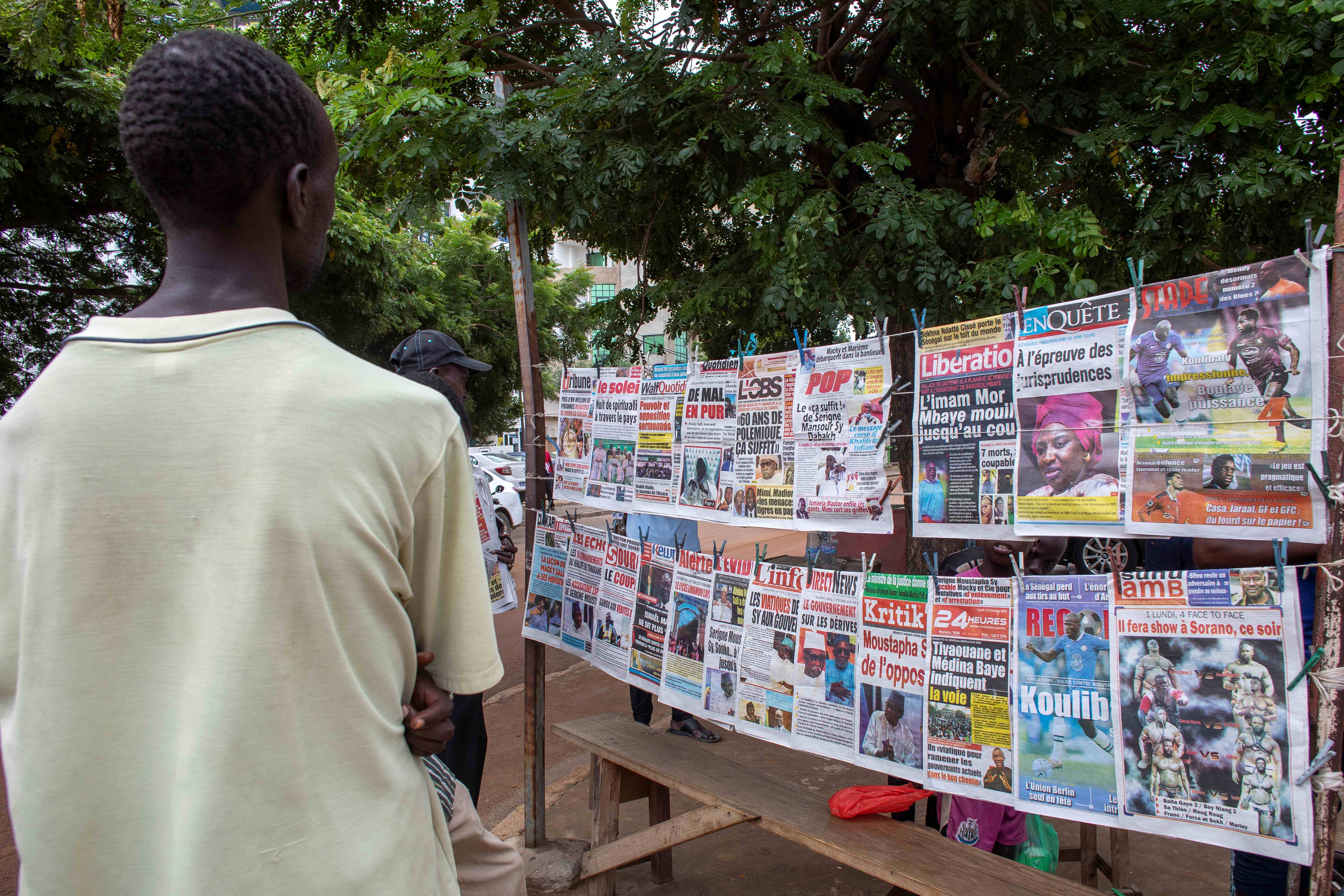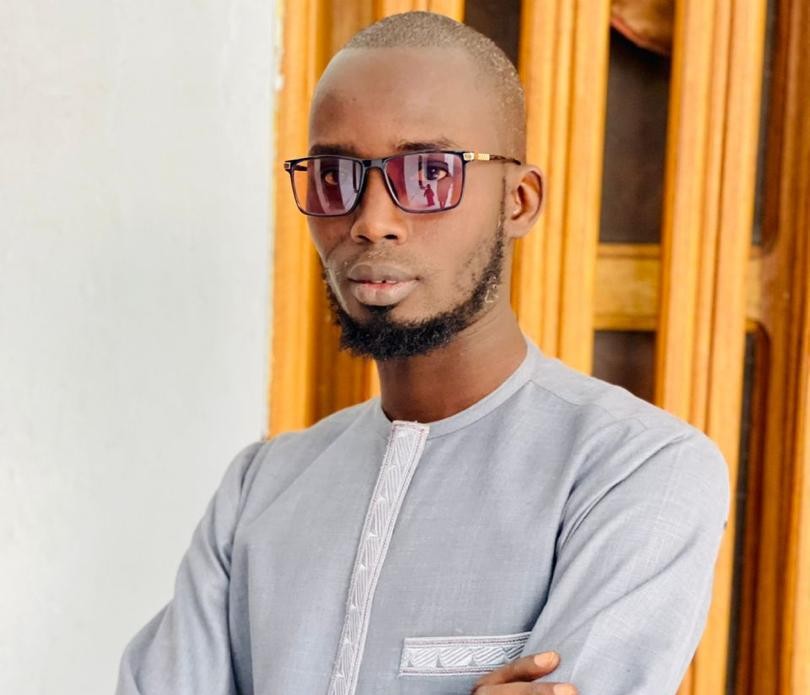صنفت منظمة "مراسلون بلا حدود" في تقريرها الأخير السنغال في المركز الـ 94 عالميا من أصل 180 بنقطة؛ إذ تتميز بتعدد الوسائل الإعلامية بأنواعها المختلفة، وقد بلغ عدد الصحف اليومية 45 صحيفة، بينما بلغ عدد القنوات 20 قناة، علاوة على أكثر من 30 إذاعة.
ومنذ عقد من الزمن تمر الصحافة السنغالية بأزمة خانقة تمنعها من الاضطلاع بدورها كسلطة رابعة في دولة تعدّ واحة للديمقراطية في منطقة غرب أفريقيا. والحال أنّ الصحافة لعبت دورا كبيرا في الحفاظ على المكتسبات الديمقراطية في السنغال التي لم تشهد قطّ انقلابا عسكريا رغم الاضطرابات السياسية التي تهدد استقرارها السياسي وحرية التعبير التي تعد ركنا من أركان الديمقراطية، ولعل الحراك السياسي الأخير الذي أفضى إلى انتخابات رئاسية في البلاد، دليل على دور هذه المؤسسات في مراقبة التحول الديمقراطي.
منذ عقد من الزمن تمر الصحافة السنغالية بأزمة خانقة تمنعها من الاضطلاع بدورها كسلطة رابعة في دولة تعدّ واحة للديمقراطية في منطقة غرب أفريقيا
أزمة مالية
تواجه الصحافة السنغالية تحديات مالية غير مسبوقة في مقدمتها التمويل غير المستدام؛ إذ تعتمد عدة وسائل إعلام على مصادر تمويل غير مستقرة، مثل الإعلانات والحملات الترويجية، الأمر الذي يجعلها عرضة للتقلبات المالية. كذلك فإن المنافسة على الإعلانات التجارية يمكن أن تكون شديدة، وهو ما يؤثر على الإيرادات التي تحصل عليها وسائل الإعلام، وقد تميل الشركات الكبرى إلى إعلانات أكثر مع وسائل الإعلام الكبيرة أو الرائدة، على نحو يترك المؤسسات الأصغر تواجه صعوبات مالية. أما الاعتماد على الدعم الحكومي أو دعم الجهات الرسمية فقد يؤثر على استقلاليتها وتوازن تقاريرها.
ولأن رياح التحول الرقمي هبت على البلد، فإن وسائل الإعلام التقليدية مثل الصحف المطبوعة والصحف الإذاعية والتلفزيونية تعيش تحديات مالية بسبب التراجع في الإيرادات من الإعلانات التقليدية؛ فهذه المؤسسات تحتاج إلى التكيف مع نماذج الأعمال الرقمية، وهو ما يتطلب استثمارات قد تكون صعبة على بعض المؤسسات، ولا سيما تلك المرتبطة برجال أعمال.
وثمة تحدٍّ آخر يتمثل في ارتفاع التكاليف، مثل دفع الرواتب، وصيانة المعدات، وتكاليف توزيع الأخبار، قد تكون مرتفعة، خصوصا في ظل قلة الموارد المالية. والصحافة في السنغال تمثل مصدرا مهما لا يمكن الاستغناء عنه في الحياة اليومية؛ إذ يستند إليها المواطنون لمعرفة ما يجري في البلاد على مدار الساعة، والتعبير عن آرائهم في الشأن العام في إطار حرية التعبير التي يضمنها الدستور.
ومع الانفجار التكنولوجي المذهل الذي صاحب الانفتاح المعرفي الذي دعمته شبكات التواصل الاجتماعي، بدأت المؤسسات الإعلامية الخاصة تعاني مشكلات مالية لقلة الموارد المالية لكثرة القنوات الإلكترونية، وقلة اعتماد المؤسسات التجارية على القنوات التلفزيونية والإذاعات للترويج والإشهار (الإعلان)، الأمر الذي جعل المؤسسات الإعلامية الخاصة في السنغال تجد نفسها سنويا في حالة اقتصادية صعبة لا تسعفها في دفع الضرائب في وقتها. ولحسن الحظ، كانت الحكومات السابقة تعفيها من الضرائب في حالة الاضطرار، ولكن الحكومة الجديدة رفضت أن تكون مثل سابقاتها، وأجبرت المؤسسات الإعلامية على دفع الضرائب بطريقة أو بأخرى.
ورغم المفاوضات التي حاولت المؤسسات الإعلامية إجراءها لتخفيض الضرائب، فقد جمدت المصالح الضريبية الحسابات البنكية للمؤسسات الإعلامية التي لم تدفع ما عليها، وذلك لتشديد الخناق على الهيئات الإعلامية حسب مدير المؤسسة الإعلامية "GFM" الذي يرى "أنّ الضرائب فوق طاقة المؤسسات الإعلامية؛ لأنّها تعاني من أزمة مالية خانقة لا تمكنها من سداد الديون الضريبية، ومن ثَم فعلى الحكومة الجديدة التفاوض مع المؤسسات الإعلامية لمساعدتها على دفع الضرائب بأقساط".
واحتجاجا على هذه الضغوطات الضريبية، بدأت المؤسسات الإعلامية الخاصة يوم الثلاثاء 13 أغسطس 2024 إضرابا عن العمل تحت شعار "يوم بلا صحافة"، وقد شاركت فيه كل المؤسسات الإعلامية الخاصة عدا صحيفتي "والفجر" و"يور يور".
ويرى مدير قسم التحرير في إذاعة "RFM" بابكر فال، في تصريح لـ "مجلة الصحافة"، أنّ "المؤسسات الإعلامية الخاصة تعاني أصلا من أزمة مالية كبيرة، وقد تفاقم الوضع بسبب الحكومة الجديدة التي جعلت المؤسسات الإعلامية الخاصة تواجه ضغوطات ضريبية غير مسبوقة؛ لذلك قررنا بدء إضراب عن العمل لمطالبة الحكومة بالتراجع عن خططها التدريجية لإعدام المؤسسات الإعلامية الخاصة.
"المؤسسات الإعلامية الخاصة تعاني من أزمة مالية كبيرة، وقد تفاقم الوضع بسبب الحكومة الجديدة التي جعلت المؤسسات الإعلامية الخاصة تواجه ضغوطات ضريبية غير مسبوقة؛ لذلك قررنا بدء إضراب عن العمل لمطالبة الحكومة بالتراجع عن خططها التدريجية لإعدام المؤسسات الإعلامية الخاصة".
أما عن الأسباب التي دفعت مؤسسة "والفجر" إلى عدم المشاركة، فيقول مصطفى جوب إنهم لم يشاركوا في الإضراب "لأنه غير منطقي وليس له جدوى؛ فدفع الضرائب واجب على المؤسسات الإعلامية جميعها، وعليه لا يمكن قبول أيّ خطوة تهدف إلى مساعدة المؤسسات الإعلامية على عدم دفع الضرائب"، بينما يرى المدير العام لمؤسسة "دي ميديا" بوغان غي أنّ دفع الضرائب واجب ولكن لا يجب على الحكومة الجديدة أن تتخذها سلاحا سياسيا لكتم أفواه المؤسسات الإعلامية التي تنتقد سياستها.
وفي المقابل يرى النائب في البرلمان السنغالي أحمد باه (ينتمي إلى تحالف الحزب الحاكم) أنّه "لأول مرة في أفريقيا تخوض مؤسسات إعلامية إضرابا عن العمل لتبرير عدم دفعها الضرائب، فمن المتعارف عليه أن المؤسسات الإعلامية تخوض إضرابا عن العمل بسبب قتل صحفي أو تعذيبه، أو وضع قيود على حرية الصحافة...".
"لأول مرة في أفريقيا تخوض مؤسسات إعلامية إضرابا عن العمل لتبرير عدم دفعها الضرائب، فمن المتعارف عليه أن المؤسسات الإعلامية تخوض إضرابا عن العمل بسبب قتل صحفي أو تعذيبه، أو وضع قيود على حرية الصحافة..."
وردّ عليه رئيس المجموعة البرلمانية لتحالف الحزب الحاكم السابق (عبدو امبو) قائلا: "إنّ الحكومة الجديدة لا تعرف أولوياتها؛ لذلك تسعى إلى إعدام مؤسسات الصحافة، وعلى المواطنين الوقوف بجانبها لأنها بسقوطها تنهار الديمقراطية في البلاد".
وبالنظر في عمق القضية، نرى أنّ الصحافة السنغالية تعاني من أزمة في الشكل والمضمون، لذلك لم يعد المواطن يثق بها ويصدق كل ما يصدر عنها؛ لفقدانها الاستقلالية في ممارسة مهامها كسلطة رابعة، وذلك يرجع إلى أنّ كثيرا من السياسيين يملكون أيادي طويلة في المؤسسات الإعلامية ويملون عليها بعض المواقف في القضايا المحلية والإقليمية والدولية؛ لذلك يجب على الحكومة الجديدة أن تدعم المؤسسات الإعلامية عن طريق مساعدتها في الحصول على موارد مالية صافية تمكنها من تحقيق الاستقلالية في مهامها.








































